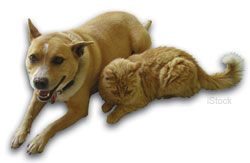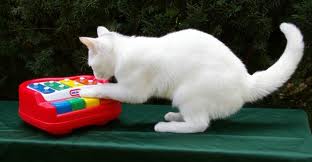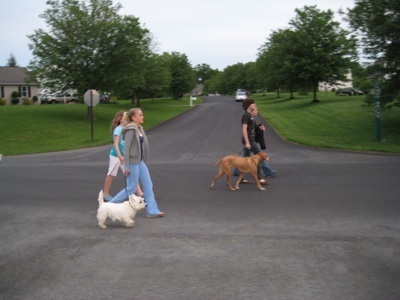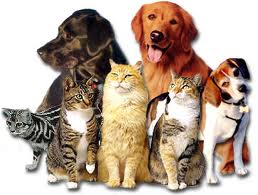Petology: Cognitive Behavior Disorder in Dogs and Cats - Animal Alzheimer's Disease and Pets
Dogs and Cats Can Develop Alzheimer's Disease
Pet owners are starting to recognize cognitive disorders in their pets, but don’t know what to do. It is known as cat and canine dementia and affects many older pets. Some aged pets may seem confused, disorientation, distant, have personality changes.This is known as Canine Cognitive Dysfunction (CCD). It is similar to Alzheimer’s disease and causes physical changes in the chemicals and on the brain. Studies show physical lesions on the brain similar to Alzheimers in people. This causes deterioration in brain functioning, remembering, and behavior changes.

What are the Signs and Symptoms of Pet Alzheimer's
- Doesn’t respond to familar commands or does not answer readily to their names, or recognize toys or family members
- They become disoriented in familar places
- They become trapped behind furniture or in a part of a room
- Can’t find their way our of a room or find the door, going down stairways
- If they lose their playfulness, or resistant to going outside
- Noticeable shaking or trembling standing or laying down
- Wandering aimlessly around your home
- Increased sleeping during the day
- Difficulty in learning new commands
- Has accidents in the house, even after going outside
- Staring into space or blankly at walls
- Being startled by lighting, tv, and other similar sights and sounds
- Change in eating habits and hesistancy to take treats
Veterinarians Rule Out Other Medical Conditions First
Depending on the dog, degenerative neurological disorders can show up at different ages. Great danes only live to about 7 or 8 years old, which means they age faster. Pet alzheimers can show up as young as 5 years of age. The giant breeds will tend to get the disorder at a younger age.In cats, it is called kittie Alzheimers disease and can be seen as young as a 7 year old.
There is no test to detect the degenerative problem, but the vets can do things to rule out other conditions like diabetes and heart problems. If they respond to treatments for this, the cognitive disorder can usually be ruled out.
New Medications are Very Effective
Some medications andnatural remedies are starting to be used to battle pet alzheimers.AniprylR is a medication approved for treating the disorder.It works by increasing the amount of dopamine in the dog’s brain. It is given everyday once the diagnosis is made.
Some side effects, although rare, include disorientation, restlessness, vomiting, weakness, anorexia, anemia, polydipsia, and stiffness. The drug can be costly.For cats, CholodinR, which has many types of B vitamins has shown to be effective responses.
Mind Stimulating Toys for Your Dogs
Mention Any Change in Behavior to Your Vet
For years, veterinarians have called these symptoms a normal part of aging and to senility. As science becomes more advanced, CCD is becoming more easily diagnosed and more treatments are becoming available.If you notice these symptoms, make sure you mention the changing habits of your dog to your vet. Not all symptoms mean your dog has CCD.
Arthritis can make a dog become lethargic and less active. If a dog loses their hearing, or vision, they may be less attentive. Incontinence could be a sign of kidney disease or urinary infection. Your veterinarian will test for these condtions. If CCD exists, there are treatments you can apply.There is no cure for CCD at this time. The drugs are showing good results and proving to be effective, even though they are expensive.
If your dog is diagnosed with CCD, you can help them cope with the disorder. Consider the surroundings your dog is dealing with. Help make their environment safe. Try to keep your dog’s surroundings familiar and easy for them to get around. Keep their environment friendly to make things easier for them.
What to Do If:
Studies are also showing, regular physical activity and moderate exercise helps to mentally stimulate your pet. Give them interactive toys and feed them foods high in antioxidants to help them maintain better mental functioning.Consult your veterinarian before you make any major changes in your dog’s food or supplements.
Make things easier for your pet if they do have CCD:
- Avoid rearranging the furniture in your home
- Get rid of clutter so there is more room for you dog to make their way around
- A ramp might be helpful for getting around stairs or on the bed
- Introduce new toys and food slowly
- Do the same for new people and new pets
- Develop a routine for feeding, walking and other routines
- Keep the commands you tell your dog to a few words so it is simple for them
- Be patient, gentle and compassionate
- Play with your dogs and cats for short intervals.


You Can Take Preventative Measures Today
The director of Alzheimer’s Disease Research at the University of California-Irvine, Carl Cottman, believes walking your dog everyday is one of the best preventative ways against Alzheimer’s Disease for humans and their petsHe noted that the decline in dog’s behavior and cognitive ability was very similar to that of people with Alzheimer’s Disease. In a research experiment, a group of dogs were part of a continuing education class for canines, which included exercise and play, and an anti aging diet. The study showed these factors are important in preventing cognitive dysfunction in your pet.What you can do starting today:
- moderate and regular exercise
- toys to stimulate and challenge your pet
- good nutrition
- continue to teach your dog new things and new tricks
- provide a stimulating environment for them
- play time and interacting with them

Make Sure You Give Your Dog Mental and Physical Stimulation
You can always teach a dog a new trick. They don’t want to ever stop learning and pleasing you. Kong toys with food or peanut butter inside the toy provide a challenge for your dog. Social activity stimulates the brain.Dogs like to socialize with other dogs.Keep your cat stimulated by giving them new toys.
Play with your cat. Studies have also shown having more than one cat or other pet enriches their lives through interaction and challenges. The same is true for your dog.There is no cure for pet Alzheimer’s. The best we can hope for is that time and technology will help to make things better. The advancement of science gives us great hope.










